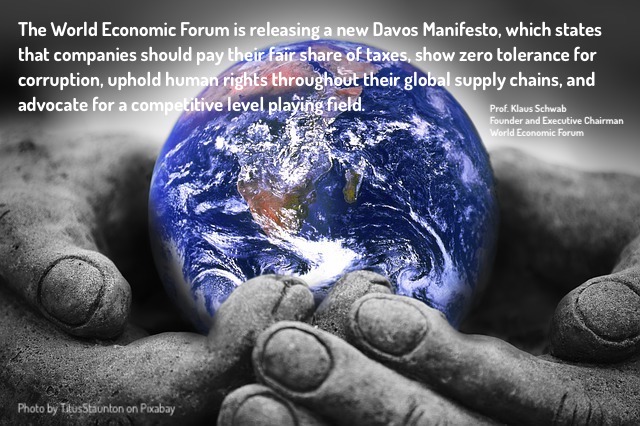
Stakeholder Economy
Prof. Klaus Schwab promoted a frame called „stakeholder capitalism“. His interpretation of this form of economy as well as the phrase itself was widely discussed. The Davos participants are criticized for their raider behaviour, draining the resources of the planet, causing climate change. Such the new Davos Manifesto is a step into the right direction and we would like to interpret what we have watched during the meeting.
The principal assumption of the stakeholder economy is, that every company that wants to prosper over time, must not only deliver financial performance, but also show how it makes a positive contribution to society. Consequently companies must benefit all of their stakeholders, including shareholders, employees, customers, and the communities in which they operate.
But where do we go from here? How can public interest be built into economic organizations? Workers could be on boards to represent their interests, but what about the rest of the community? How can we incorporate environmental and social purpose into corporations?
As the concept takes an anthropocentric perspective, while some groups like the general public may be recognized as stakeholders others remain excluded. Such a perspective does not give plants and animals or even soil and natural raw materials a voice as stakeholders, but only an instrumental value in relation to human groups or individuals.
Basic economics shows that the planet cannot carry our linear production path any longer. The circular economy represents a significant opportunity, as well as a challenge, for all of us. As the consequences of our current production model are becoming increasingly evident, the circular economy proposes a radically different way of thinking about economic activity: a way that also safeguards economic prosperity in the long term. By laying down the economics behind a circular model, it provides the theoretical foundation to further explore the conditions for increased prosperity and care for the environment.
By re-organizing our economy along the principles of our global life support system, that is the ecosystem of planet earth, the circular economy enables us a continuous cycle of value creation, where nothing is wasted and economic, social and environmental value creation is optimized.
Circularity and systemic thinking challenge our current way of thinking and spurs us into action. It encourages us, whether in government, business or civil society, to develop circular strategies and acknowledging our interdependence for system change.
Author: Dr. Hans Meves



No Comments